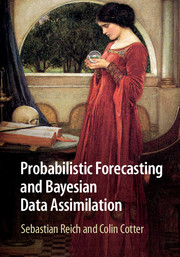Book contents
- Frontmatter
- Contents
- Preface
- 1 Prologue: how to produce forecasts
- Part I Quantifying Uncertainty
- Part II Bayesian Data Assimilation
- 6 Basic data assimilation algorithms
- 7 McKean approach to data assimilation
- 8 Data assimilation for spatio-temporal processes
- 9 Dealing with imperfect models
- A postscript
- References
- Index
8 - Data assimilation for spatio-temporal processes
from Part II - Bayesian Data Assimilation
Published online by Cambridge University Press: 05 May 2015
- Frontmatter
- Contents
- Preface
- 1 Prologue: how to produce forecasts
- Part I Quantifying Uncertainty
- Part II Bayesian Data Assimilation
- 6 Basic data assimilation algorithms
- 7 McKean approach to data assimilation
- 8 Data assimilation for spatio-temporal processes
- 9 Dealing with imperfect models
- A postscript
- References
- Index
Summary
So far we have investigated the behaviour of data assimilation algorithms for models with state space dimension Nz ≤ 3. Furthermore, we have investigated the behaviour of ensemble-based data assimilation algorithms for ensemble sizes M ≫ Nz. Classical theoretical results about particle filters discuss convergence to the optimal estimates for M → ∞ within the perfect model scenario and with fixed dimension of state space Nz. While we do not cover these theoretical results in this book, in the previous two chapters we found that the particle filters did indeed converge numerically in terms of their time-averaged RMSEs as the ensemble size M was increased. In fact, the same observation also applies to the ensemble Kalman filters. However, an ensemble Kalman filter does not generally converge to the optimal estimates because of a systematic bias due to the Gaussian assumption in the Bayesian inference step. Nevertheless, the ensemble Kalman filter remains a very popular method in the geosciences since it has much better control over the variance error for small ensemble sizes.
In this chapter, we will apply ensemble-based data assimilation algorithms to models which arise from spatio-temporal processes. More specifically, the models from this chapter can be viewed as spatial and temporal discretisations of partial differential equations (PDEs). For simplicity, we will only consider evolutionary PDEs in one spatial dimension (denoted by x). The dimension of state space of the arising models is inversely proportional to the spatial discretisation parameter Δx and the limit Δx → 0 leads to Nz → ∞. While a rigorous analysis of data assimilation algorithms for M fixed and Nz → ∞ is beyond the scope of this book, we will demonstrate some of the practical problems that arise from such a scenario, which is often referred to as the curse of dimensionality. We will also introduce ensemble inflation and localisation as two practical techniques for making ensemble-based data assimilation techniques applicable to spatio-temporal processes.
- Type
- Chapter
- Information
- Probabilistic Forecasting and Bayesian Data Assimilation , pp. 229 - 258Publisher: Cambridge University PressPrint publication year: 2015

